|
Eid Special
Jammed Thoughts
Tamanna Khan
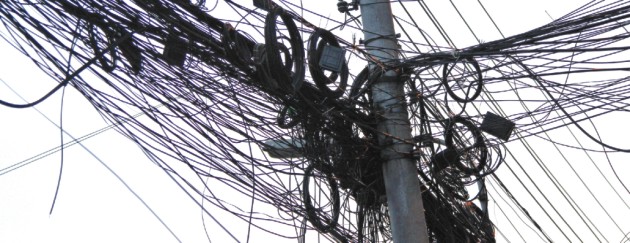
One might wonder why the present government had pledged a digital Bangladesh in their election manifesto. Is it only to keep pace with the changing world of the twenty-first century or is there a deeper vision inside? Those who have better things to think about for instance, what to have for iftaar and what to wear in Eid, might just write off the electoral pledge as yet another marketing stunt. But for people like us with lots of time to kill and brood over silly things, the reason the present government wants to create a digitalised Bangladesh is far more visionary. Contrary to popular belief, the present government has rightly anticipated that within a year or two of their ascent to power, the population of the capital, the centre of power, will double or triple and the place will just literally solidify meaning the inhabitants will only have space to sway to and fro.
So how is this situation related to the idea of digitalising Bangladesh? The answer comes only when you are stuck in a traffic jam for hours and on special days when it has rained torrentially for only half an hour you cannot even afford to get down from the vehicle and depend on your age-old legs to carry you to your workplace on time. Only then do you realise the greatness, the far sight, ingrained in the concept of a digitalised Bangladesh. For someone like myself with minimal technological knowledge, digital refers to computers and internet either in the broadband form with lots of hanging wires, or the wireless form with a telephone-company tower looming here and there. Thus a digital Bangladesh would mean no need for a physical workplace and consequently no need to lose one's temper and time in trying to reach the workplace. It will mean one can happily wake up in the morning, log on to the PC or laptop and type in good morning to the boss instead of facebook buddies. Using video conferencing meetings can be held and the bright side is any interrupting, talkative colleague can be shut off intentionally and later the excuse of a network problem can be given at ease. The same technique can be used against an angry lecturing boss, however such methods can be reciprocated. Once the meeting is done and assignments distributed, the job can be done at your own time sitting comfortably in bed amidst lots of pillows and a hot cup of perfect homemade tea. A virtual office also reduces the need to spend hard-earned money behind greasy fast foods and adulterated street-food, that you now call lunch. Even the water crisis can be solved through a virtual office. As you are not going out and meeting people in person you don't have to worry about brushing teeth, bathing, or washing clothes since clothes will not get dirty and you can wear the same dress everyday, giving your straining wallet a rest. Even imparting education can be done through the net and the happy school-free days of your brats will come to an end. If question arises how far students would learn in this new system; well, if most of the information you need, can be googled up, who needs to learn and memorise things anyway?
Lest you really need to go out, the digital concept again comes in handy. All the jumbled up internet wires crisscrossing the sky of Dhaka can be used for creating a efficient network of ropeway by attaching a pulley to the wires, with the roof tops as the stations. It will also create employment as people can be employed and stationed at the rooftops to operate the pulleys. If this sounds too expensive, the old-fashioned Tarzan system can always be used. In that case we can go a little further and so some conservation activities by employing the almost extinct monkeys of Old Dhaka as guides for the less brave section of the population. However this system should be accompanied by a dress code as attire like lungi, saree, and skirt cannot be used while travelling the Tarzan way.
Thus digital Bangladesh or at least a digital Dhaka is the solution to the unending transportation challenge that we face and the government has correctly foreseen it. All they need to do now is supply uninterrupted electricity and Internet service for making it all work.
Between Dhaka and Dacca
TAMANNA KHAN
With only a week left for the Eid-ul-Fitr, Dhakaites are going crazy over Eid shopping. Gleeful shopkeepers inform the television reporters, “This is the only time of the year when business goes really well. So we thank the government for allowing us to keep the shops open till late at night and ensuring electricity supply.” Dhakaites too are making the most of this rule, which is evident by the late hour traffic jam in front of popular malls like Bashundhara City. In fact, traffic jam has toppled beguni (fried sliced eggplant coated with pea-nut flour) and kancha morich (green chilli) in this year's Ramadan to become the centre of all attention. Schools and CNG stations have been closed down to make room for the extra pressure Dhaka faces during the month of Ramadan. This entire hullabaloo about Eid is nothing new for Dhaka, it has always been the centre of many important festivals and Eid is no different. Till the moon signalling Eid, hits the Dhaka sky, the city remains a hive of a million bees: people coming from all over the country either to shop or to sell, or to earn an extra dime, for Dhakaites, from the time of the Moghuls, are known to be overtly generousness during this time of the year.
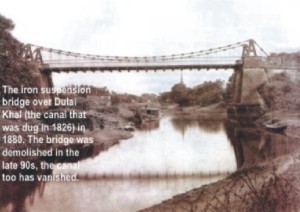 From the day of the Eid till the end of government holiday, Dhaka remains wonderfully jam-less, as most people head back to their family abode in far-off corners of the country. Some, from the new and affluent class would take the opportunity of the long holidays and go for vacation abroad. And those of you with no roots left in the cool shades of the villages will wake up as usual on Eid days, eat semai (vermicelli), and open the previous day's newspaper with news of war crime trials, high court rulings, murders, suicide, damaged roads, worsening power crisis and the pages filled with Eid fashion, recipes, and promises of special programmes on the channels. At one point, when flipping through the newspaper will begin to get on your nerves, you will probably pick up the cellphone trying to convey Eid greetings to friends and family; however that too may turn out fruitless, as the all the phone company networks will remain busy. You can then try your luck with the television and if you are fortunate enough, the government may just decide to give you a break from the continuous power failures on Eid day. However, a much more irritating phenomenon in the name of advertising will present itself the moment you switch on the television to watch your favourite programme. Having enough of remote surfing, you will perhaps decide to venture out on the streets of Dhaka to visit friends or popular hangouts, but then the public transportation have gone off to holidays and the scanty rickshaws will charge rocket-soaring prices which will only add to your already boiling point mood. At this point, you better head back home and do some brooding, like imagining yourself a hundred years back. From the day of the Eid till the end of government holiday, Dhaka remains wonderfully jam-less, as most people head back to their family abode in far-off corners of the country. Some, from the new and affluent class would take the opportunity of the long holidays and go for vacation abroad. And those of you with no roots left in the cool shades of the villages will wake up as usual on Eid days, eat semai (vermicelli), and open the previous day's newspaper with news of war crime trials, high court rulings, murders, suicide, damaged roads, worsening power crisis and the pages filled with Eid fashion, recipes, and promises of special programmes on the channels. At one point, when flipping through the newspaper will begin to get on your nerves, you will probably pick up the cellphone trying to convey Eid greetings to friends and family; however that too may turn out fruitless, as the all the phone company networks will remain busy. You can then try your luck with the television and if you are fortunate enough, the government may just decide to give you a break from the continuous power failures on Eid day. However, a much more irritating phenomenon in the name of advertising will present itself the moment you switch on the television to watch your favourite programme. Having enough of remote surfing, you will perhaps decide to venture out on the streets of Dhaka to visit friends or popular hangouts, but then the public transportation have gone off to holidays and the scanty rickshaws will charge rocket-soaring prices which will only add to your already boiling point mood. At this point, you better head back home and do some brooding, like imagining yourself a hundred years back.
So what was going on around this time of the year in this beloved city called Dacca (that was the spelling used by the British) in the year 1910? Were people frantically shopping for Eid? Were the streets congested with 10 different types of vehicles? What was the major news in the papers of Dhaka? What did the typical Dhakaites do on Eid day?
Eid-ul-Fitr, decided by the lunar calendar, probably did not come around on September in 1910. Even if it had, you would probably not be on a holiday for the occasion, since Eid in the times of the British Raj did not receive much attention at the government level as did Christmas. Government documents of the time showed many Muslim officials applying for extension of holiday for Eid. So had you been a service-holder back in 1910, you would probably not be planning a trip to Barisal on the Eid holidays let alone to Bangkok. However, the need for a new dress on Eid would still be there, though back in 1910 that dress would have been homemade just like the special Eid foods. Akin to our shopping from the very first day of Ramadan, womenfolk a hundred years back used to start the preparation for Eid from the very first sighting of the Ramadan moon -- taking measurements of the kids and other family members designing clothes, cutting, sewing and the rest. Unfortunately, even a century ago you would probably have to start your Eid day with the cliché semai only that too would have been 100 percent home made, coloured with flower extract or saffron. However, being a Dhakaite you would probably be buying other Eid delicacies from Chawk that had always retained its mouth-watering Moghul delicacies, selling items like shirmali, bakarkhani, chapati, naanroti, kakcha, kulicha, nankhatai, shikhkebab, handikebab, faluda and so on.
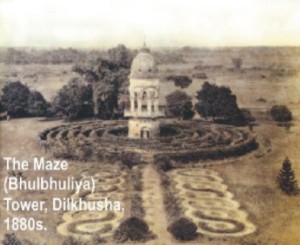 After a hearty meal, you probably would have ventured out for a stroll in the suspension bridge over Dholaikhal or fanned yourself in the fresh breeze of the Buriganga at the Buckland Embankment and watch the fanfares of the Ahsan Manzil or the magnificent palace of Babu Rup Lal Das and Raghu Lal Das, from a distance and fume in envy. You could also go visit the Eid fair being held at Ramna and buy a few wooden toys or bamboo household items or watch the Kabuli's dance. Had you had a knack for gambling perhaps you could watch a race at the Ramna racecourse. If you were of the more aristocratic type you would probably go check out the new photography studio of Dacca or look out for new shows at Purbabanga Rangabhumi, Crown Theatre Stage or the Diamond Jubilee Theatre. After a hearty meal, you probably would have ventured out for a stroll in the suspension bridge over Dholaikhal or fanned yourself in the fresh breeze of the Buriganga at the Buckland Embankment and watch the fanfares of the Ahsan Manzil or the magnificent palace of Babu Rup Lal Das and Raghu Lal Das, from a distance and fume in envy. You could also go visit the Eid fair being held at Ramna and buy a few wooden toys or bamboo household items or watch the Kabuli's dance. Had you had a knack for gambling perhaps you could watch a race at the Ramna racecourse. If you were of the more aristocratic type you would probably go check out the new photography studio of Dacca or look out for new shows at Purbabanga Rangabhumi, Crown Theatre Stage or the Diamond Jubilee Theatre.
However, your tour in Dacca would have to be done either on foot or by a horse-drawn carriage; walking on the narrow streets of 1910 Dacca meant you always had to be on the lookout for carriages and the few speedy motorcars that often ran down people. And if the time was around August or September 1910, be ready to face a very familiar friend of yours from 2010 - Water-logging. News in the 1910 Dhaka Prakash showed that heavy rainfall flooded areas like Bangshal, Malitola, Shakhari Bazar, Laksmi Bazar, even the posh residential area Wari. It seems that the waterlogging problem had already ensued 100 years back and the municipality had miserably failed in addressing this problem.
Chances are also high that you would probably be shot at, stabbed or robbed of your possessions by some swadeshi zealots. The tension between the Hindu educated middle-class and the wealthy Muslims of Dhaka had not been going well after the partition of Bengal in 1905. Since the Muslims advocated the partition, the Hindus had begun to mistrust them in the movement for freedom. The swadeshi movement, with deep-rooted beliefs in independence through armed struggle had set up associations like the Anushilon Samity in Dhaka, where young students were given training on bamboo fights and use of other weapons. To collect money for purchase of weapons, many swadeshis used to rob wealthy men especially, Muslims who they thought acted as police informers.
Reflecting on all these had you decided to remain at home and go through papers like Dhaka Prakash you would probably come across pages of the Dacca Conspiracy Case proceedings, news of dacoity (robbery) at different parts of Bengal, the sensational news about betel leaf poisoning and women, not forced to suicide on account of eve teasing, but being stoned to death on suspicion of witchcraft and those that dared to travel alone in trains being robbed and chopped up by dacoits. But not all was bad back in 1910; there was news about new buildings like the picturesque Curzon Hall being constructed, news of new educational institutions coming up in this part of Bengal, Nawab Salimullah signing up Octavius Steel & Co to supply electricity to the citizens of Dacca and Ramna turning into the dream of political planners with its beautiful red buildings against the backdrop of green.
Yes, Dhaka was still green a hundred years back, especially the part beyond Lalbagh. The largest stretch of green in Dhaka - the Ramna, that British planners were so much in love with a century ago, has fortunately escaped the eyes of land grabbers and developers. Though Ramna had to give up a lot of its beauty and area to establishment of the University of Dhaka, it still breathes fresh air among the polluted particles of Dhaka's environment. Once you return from your tour of 1910 Dacca, maybe you can take a little Eid vow to save whatever green characteristic that is left in our beloved city. So that a Dhakaite from the 3010 will not have to read about Ramna Park only in pages of a history book, like you do about Phoenix Park, but can actually go and take a peaceful stroll there.
The Ultimate Guide to a Better Life
Pocketsize compilations of knowledge sold at Tk. 5 on the city streets
are apparently the definitive guides to happier, healthier and better living.
Kajalie Shehreen Islam
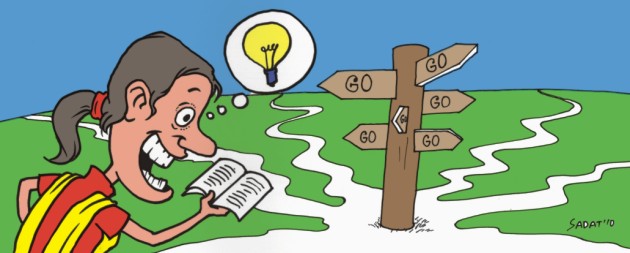
History, philosophy, religion all guide us in our lives. We learn from the mistakes of others and ourselves; we ponder and debate over right and wrong; we hear and preach sermons about good deeds and sins. If misguided, we wallow in the shame of our own mistakes, and, even worse, depending on our belief system, burn in hell. The risks are great and learning may come all too late. While heavy volumes of history, philosophy, religion and of course the all-powerful self-help books abound in libraries and bookshops, how great a weight of knowledge (and paper) can we carry around with us at all times? What we really need is a pocketsize combination of all of the above.
Light, thin compilations brimming with knowledge on the do's and don't's of life are actually available on the streets of Dhaka (keep your ears perked for the canvassing – 'the consequences of everything you do, at Tk. 5') at unbeatable prices. Some of the things you already know, such as saying a prayer at night for a good night's sleep, or to keep the devil at bay, or, best of all, for all your sins to be washed away. Others are common sense, such as the blessings you will earn if you keep your parents happy. Still others you may have picked up from here and there – the herbs to make your skin more supple, your hair more lustrous, your stomach more stable. But, in addition to all this, hidden away in this great book are misdeeds bordering on sins you never thought you would ever commit, let alone know that they would have such dire consequences.
For example, who ever knew that you would become less intelligent if you combed your hair with a broken comb, or that you would have memory loss if you made a pillow of a book or have evil thoughts if you looked into a broken mirror? Did you think your heart would turn to stone if you left some of the buttons of your shirt undone, or that you would become a hardened human being if you walked about without any clothes on or that your fate would be ruined if, instead of wearing your clothes, you carried them around on your back? Women would never eat paan and try to look at the colour of their tongue if they knew that it meant they would have to cry all their lives if they did so. Men would never try to seduce minor girls if they knew they would turn blind if they did so. They would rather keep their wives under control by tying their hair to a tree out in the garden. There would be fewer widows if women knew not to look at their waists in the mirror and no one would smoke while in the toilet if they knew that their livers would shrivel up if they did so. You would stop biting your nails today if you knew that this was the root of all your troubles. And of course everyone would practically be bathing in milk, honey and all the other listed ingredients if they knew that it would improve the function of their various organs, leading to a fulfilling conjugal life.
After a whole month of fasting and practising self-control during Ramadan, this Eid, find out what you can do right in your life throughout the year. The ultimate guidelines to living life the right way may also be the perfect gift for your loved ones. If nothing else, it will be an entertaining read.

I thought I was really Bengali. I can speak Bangla in an office setting or a village setting. I know when to drape a scarf over my head during the prayer calls and how to haggle with a rickshawallah. In America, I look for excuses to don my sari and churi. I thought I had Dhaka down pat.
This fall I took off from work and classes to spend some time in Bangladesh. I was determined to experience the Dhakaiyyan life. No constant family cars and shopping trips to Gulshan. This meant CNG rides and walking to Gawsia market. This quest of mine showed me that I'm not really ready for the Dhaka, and Dhaka isn't really ready for me. Cue the awkward situations.
My cousins often accused me of being way too khyat (out of fashion) in Dhaka. “You're not in some tiny little Bengali community in Virginia anymore! Stop with the cotton prints! Why do you look like you came from Shadarghat?” I admitted defeat in the face of peer pressure and went for the silk, buying an embroidered mint green dress from a boutique.
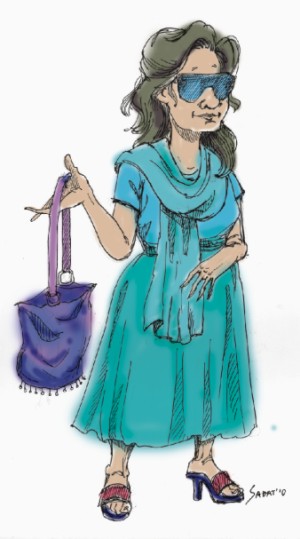 The next day I insisted on commuting to work from Purana Paltan. My grandmother's only condition was that I take along Sohel, who had come to work as a helping hand at my grandparent's house straight from a village madrassa. I finally caught an empty rickshaw. He asked for 60 taka. I unsuccessfully argued in a less than angry voice, and he ended up with 55 taka. Cue the tsk tsks of seasoned aunts across the nation. The next day I insisted on commuting to work from Purana Paltan. My grandmother's only condition was that I take along Sohel, who had come to work as a helping hand at my grandparent's house straight from a village madrassa. I finally caught an empty rickshaw. He asked for 60 taka. I unsuccessfully argued in a less than angry voice, and he ended up with 55 taka. Cue the tsk tsks of seasoned aunts across the nation.
Halfway, we were told that it was a VIP road and rickshaws were not allowed. Sohel and I found ourselves standing on a jam-packed road with no sidewalk and no empty rickshaws in sight. Impatient, I told Sohel we were walking 20 minutes. He merely nodded his head and adjusted his toopi and alkhalla.
Finally, there was a sidewalk on the other side of the road! We began the intricate dance across whizzing traffic. Five weeks had trained me to avoid following my instincts which were screaming at me to shut my eyes and curl up in a fetal position on the asphalt so my death wouldn't be a guessing game anymore. From the midway road divide I noticed several street guys gathering at our destination. By the time we crossed the road there was a good crowd waiting. Perplexed, I walked through the crowd to climb onto the sidewalk and noticed a huge sign in front of me reading “Film Development Institute”. The whispers of “naika naika” (actress, actress) reached my ears.
In a rush with no clean laundry, I had grabbed the new Anarkali dress and scarf. I couldn't find the matching pants and I thought nothing of it since I passed my grandmother's inspection before leaving home. In my sudden whim for pedestrianism, I forgot about my exposed ankles. My large bag, a shade of purple, oh-so-chic for the winter 2009 H&M collection but bizarrely out of place here, was hanging casually from my hand. I barely wear sunglasses, so I dug out my obnoxious, silver aviator glasses that cover half my face. Take note reader, Bengali actresses are never stick skinny and neither am I.
We had inadvertently crossed the street directly in front of the Film Development Institute and I suspiciously fit the description of a Bengali actress well. I led Sohel out of the crowd with quick steps. Sohel started murmuring a protection prayer. Once the boys stopped following us and singing the ever classy “choomma choomma dey dey”, Sohel asked “Apa, don't you have any Bengali clothes?”
I decided looking dowdy and khyat was much, much better than being mistaken for a cheesy Dhallywood actress any day. I went back to my dowdy cotton pieces, and the dress now lies in a crumpled heap under my bed.
GoingHome
Farhana Urmee
Since the first of Ramadan, Ashraf has been keeping an eye on the newspapers to find out when bus tickets are put on sale. Finally he got the news that the tickets would be on sale from mid-Ramadan.
On the night of 14th Ramadan, he could not sleep. He was too excited about finally getting a ticket and going home. The last time he had gone was five months ago. Ashraf left for the bus counter in Gabtoli after Fazr prayers on the morning of 15th Ramadan.
Half an hour after noon, Ashraf shouted with joy and came out of the bus counter holding a ticket in his hand.
“I will be leaving the city for home after having my dinner on 28th Ramadan,” says Ashraf, adding, “I would have to have Sehri on the way for the next Ramadan but I won't mind.”
Ashraf is one of the many city dwellers compelled to live in the city to earn a living, leaving family and friends back home.
For the whole year Ashraf waits for this chance to be home, something that seems to be over in the blink of an eye. Ashraf took a few more days off besides the usual Eid vacation to spend more time with his parents and siblings at home in Nilphamari, far away from the chaotic polluted city life that he leads.
“I finally got my ticket for Nilphamari,” says a relieved Ashraf.
All the bus services are busy selling tickets from the 15th day of Ramadan. According to the bus service providers, the tickets were almost sold out in three days.
 “People are rushing every day from August 25 for bus tickets and 95 percent tickets are already sold,” says Shahidul Islam, manager of Haque Enterprise that runs bus on the Dhaka-Rangpur route. Prices are higher than usual on the occasion of Eid. But people do not seem to mind paying some extra money when it means going home. “People are rushing every day from August 25 for bus tickets and 95 percent tickets are already sold,” says Shahidul Islam, manager of Haque Enterprise that runs bus on the Dhaka-Rangpur route. Prices are higher than usual on the occasion of Eid. But people do not seem to mind paying some extra money when it means going home.
Ashraf has paid Tk 480 per ticket instead of its regular cost of Tk 300.
“I never mind paying more. Getting the ticket was all that mattered to me when people struggle to manage a ticket, even from black market.”
Bus service providers, however, justify the extra charge saying that a return trip to Dhaka would be a loss as the bus would be practically empty.
Not only bus counters but all modes of transport are busy selling special tickets for Eid.
It is the same scenario at all ticket counters, whether it is for train, launch or air plane. With a lot more passengers wanting to go home than the number of public transport, many people have to travel standing all the way in the bus or risking their lives on the rooftops of buses or trains.
Bus and train services have arranged special routes for providing additional trips to manage the huge rush of people going out from the city.
People from all walks of life will be taking whatever transport is available and in accordance to what they can afford.
People of the southern part of the country are flocking to the city's Sadarghat Launch Terminal every day to either purchase tickets or set off from Dhaka. In the last four or five days of Ramadan, one lakh people will be leaving from Sadarghat in Dhaka every day, says the Port Officer of the launch terminal.
Most of the tickets for the cabin are already sold and the rest are pricey. Extra launches are not included yet but the services are providing additional trips on different routes. Bangladesh Inland Water Transport Authority (BTWA) will commence special launch service for Eid from September 5.
The closer Eid day gets, the emptier Dhaka's streets become.
Ashraf will be travelling 12 to 14 hours before reaching home for Eid. Even though it will be a grueling journey, for Ashraf the fatigue and chaos will disappear as soon as he reaches his destination. Home.
Eid Away from Home
Anika Hossain
As a child, I thought of Eid as the most exciting day of the year, aside from my birthday of course. Eid meant new clothes, presents, deliciously rich food, visiting cousins and of course, Eidi, the easiest money us children could earn, simply by touching the feet of every adult around us and asking for their blessings. Eid was always family time for me, even as I grew older, a large part of my day was always spent at home, before prancing off with my friends, in the evenings. The childish excitement for the day soon faded, but the days leading up to Eid were always fun and I found myself infected by the enthusiasm with which the preparations in our household ensued. The shopping, the planning, and the cooking, (not so much seeing relatives I barely knew), I looked forward to waking up early in the morning to enjoy the festivities which by then I had taken for granted would always be a part of my life.
When I went off to college in the States in 2003, I spent my very first Eid away from home and I was completely unprepared for how lonely I would feel, and how much I would miss my family. Trying to adjust to life in a foreign country and coping with my already heavy workload, it had completely slipped my mind that Eid was around the corner. It wasn't until I received an invitation for a community iftar and an Eid dinner from the Muslim and South Asian Students' Association at Smith (my college) that it hit me that I would be thousands of miles away from home on Eid.
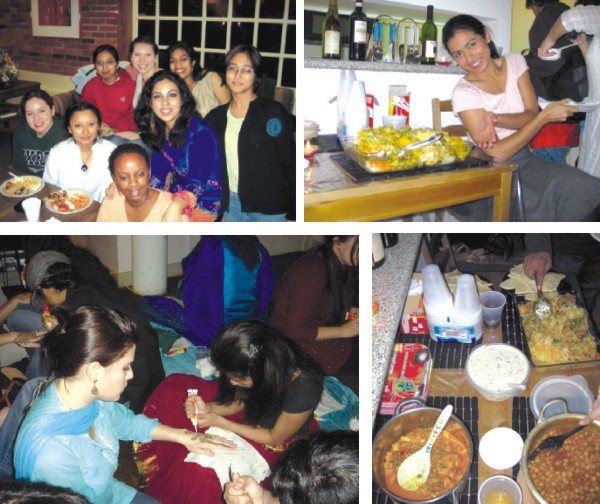
Eid preparations at Smith College.
I did not take it well. I remember a very tearful phone call to my parents right after this realisation, begging for them to take me back home (I am still embarrassed when I am reminded of this). I also remember going into a lethargic mode a few days before Eid and feeling unmotivated to do anything except dwell on how much I missed homemade iftars and going Eid shopping with my mother.
On the day of the community iftar, coaxed by my friends, most of whom were seniors and knew how it felt to be away from home on a special day, I decided to make an appearance just to see what it was all about. The iftar was organised by the Muslim Students' Associations (MSA) from the five college area (University of Massachusetts, Amherst College, Mt. Holyoke College, Hampshire College and Smith College). Arrangements were made for about 300 people and I was amazed by the turnout. Not only were most of the Muslim students in the five college area present, professors and students from different cultural and religious organisations also attended the event.
I remember meeting many fellow Bangladeshi students and making new friends. I also remember how great it was to hear the Azaan on the elaborate sound system they had arranged. After iftar, guests were invited to share their memories of Ramzan and Eid celebrations back home and talk about what they missed most. Sharing cherished memories and little worries helped us all bond and cope with being away from our loved ones. This was the best part of the event and it was kind of like group therapy for all of us.
In the days that followed, I was determined not to be upset, and have the best time I could with my new friends. The Eid dinner was organised by the MSA and the South Asian Students Association (Ekta) at Smith on a much smaller scale, and only Smithies were invited. We were given an Eid budget and were told we could cook our favourite dishes for the dinner if we wished to. There were about five Bangladeshis beside myself, and we decided to cook biriani together. We borrowed a car from the college and went shopping for our supplies to Amherst town and had the time of our lives trying to figure out which Indian food store was better than the other.
When Eid arrived, we woke up early, just as we would at home, and gathered at Unity House (club house for cultural organisations at Smith) and began our cooking. We had to share the kitchen with the other girls who were also cooking and soon the air was heavy with smells from Bangladesh, Pakistan, India, Saudi Arabia, Nigeria, Palestine, etc. In the evening, feeling extremely productive and proud of our efforts, we all dressed in our best clothes and arrived at the dinner. I still remember the struggle of wearing a sari all by myself for the first time. I think it took me about an hour (maybe more).
All that was forgotten, however, as the evening continued. We devoured the scrumptious food, admired everyone's outfits, exchanged recipes, complained about classes and learned about each other's cultures. We sang songs in our native languages and watched a movie together towards the end of the night. It definitely wasn't like home, but I remember thinking “this isn't so bad either.” Although I had a decent time, I still called my parents and cried some more about missing home (yes, I was pathetic).
In the years that followed at Smith, we continued our little Eid rituals, but every year was different, because with every passing year we became more like a family, and it was our responsibility to look out for the freshers who had to endure their first lonely Eid, just like we did at one time. I'm still grateful to all my friends for making my Eids at Smith special and memorable.
I never really stopped missing home during Eid, but after I graduated and started work in the real world (Boston, for me), Eid used to come and go, and sometimes, I wouldn't even realise this until a week after the fact. But when I did, I would find myself not only thinking of Eid in Dhaka, but also about Eid with my closest friends at Smith and find myself wishing I could go back to my old campus where Smithies who have taken our place are probably celebrating just like we did not so long ago.
Farooki's Calling
Elita Karim
The backdrop is as bizarre as his personality; the walls of the set are covered in paper with black figures and doodles sketched all over. Set in one of the empty factory buildings in the industrial area of Tejgaon, Mostafa Sarwar Farooki is seen instructing his team regarding the TVC shooting which will start early the next morning. Filled with energy, enthusiasm and a lot of innovative ideas, the set crawls with colourful paper strips, lights and cameras reflecting Farooki's sheer creativity and his ability to drive himself to work relentlessly, day and night.
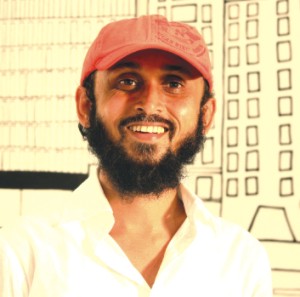 |
| Mostafa Sarwar Farooki |
Recently, having won awards for his critically acclaimed film 'Third Person Singular Number,' Farooki, as always, has managed to introduce something different and unique through his work to the Bangladeshi audience. "I show the truth," says Farooki, who, a month ago, also flooded the newspapers and other forms of media after finally tying the knot with the famous actor Tisha. "My films give a very honest reflection of the society that we live in – be it the way one speaks or moves or even thinks."
With a smirk, Farooki admits that he is tired of answering questions about the movie 'Third Person Singular Number,' which also attracted a lot of negative response from certain areas of society. Farooki's portrayal of a single young woman trying to fight the cruel society and at one point sharing an apartment with a male friend gave rise to a lot of protest amongst many viewers. "The members from the Hizb-ut-Tahrir had also made a lot of noise about the movie," says Farooki. However, he has no regrets about what he portrayed in the movie. After all, as he mentions, it was an actual portrayal of what happens in society today.
Starting his movie making career with 'Bachelor' in 2003, Farooki went on to make yet another feature film titled 'Made in Bangladesh' in the later years. "The youth can still relate to 'Bachelor'," says Farooki. Inspired by his own life, he says that a lot of young filmmakers, especially, can relate to the movie. "Similarly, politicians would be able to relate to 'Made in Bangladesh' very well." In fact, Farooki adds that he fears to hope that politicians might be relating to this movie for a long time.
As he reminisces back to his shooting days and the earlier scripts, he suddenly gets slightly wistful and makes yet another confession. "I really wish 'Third Person Singular Number' was my first film!" he says, "Cinematically, the film is a lot more mature." And then, his roller-coaster thoughts take a whirlwind ride and come back to reality. "But then again, I would have to be at least a few-films-old to reach this level of maturity, right? My first two films were stepping stones for my last film!" He gives his usual crazy laugh and looks satisfied with his answer.
Farooki is currently working towards three new films and television adverts. "I don't plan to work in the television media for the next five years at least," he confesses.
He says, "See, I was always interested in the film media right from the beginning. But I needed to familiarise myself with the whole scene, needed to 'fine-tune' my skills! It will just be a waste of time, energy and creativity if I work in the television media now. I want to use all my ideas and energy on films at the moment."
One of his movies, 'Television', is a story, which surrounds the age-old traditional beliefs held on to by groups and individuals in certain parts of the country, in the hopes of upholding religious sentiments, having been around for years. "Religion and culture are both required for people to survive by in this country," says Farooki thoughtfully, "By culture I mean the customs and the lifestyle that a people of a land have devised in order to communicate and live with each other. At times we find that culture and religion cannot come to terms with each other. However, we need to find a common ground for both these elements to come and blend together."
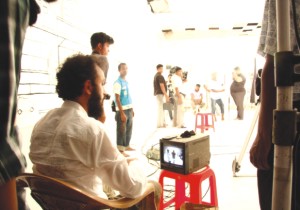 |
On location: Farooki shooting for an advert. photo: zahedul i khan |
Mostafa Sarwar Farooki, considered to be one of the most unique and experimental directors in terms of story lines, language delivery and not to mention the very art of direction, has many more reasons to celebrate. Recently, Farooki received the Asian Cinema Fund award for his script 'Television.' "We had applied a few months ago for this award with our script," says Farooki. "Just a while back we got the award, of about 10,000 USD." He goes on to explain that there are three major organisations in the world, which fund foreign films. "One is the Sud Fund, which is funded by the French government," he says, "Tareque Masud had previously received this award for Matir Moina. Another major award is the Hubert Bals Fund and the other one is the Pusan's Asian Cinema Fund, which we won. After this we also applied for the Pusan Promotion Plan, which we received as well. It is a co-production plan, which invites scripts from all over the world. Then the authorities pick around 30 scripts and ask producers to co-produce them. This is the first time that any Bangladeshi film got selected in a co-production plan."
In between sips of ginger tea, a very vocal Farooki speaks about how ‘filmdom' is slowly changing in Bangladesh. "There are many young filmmakers who are coming out with their talents and expressing their ideas through their films and visuals," he says. "I support the fact that the government has banned Indian films into the Bangladeshi halls. You see, there are many countries, which have not yet gone through the Hollywood influence, for instance the Iran film industry. This is one of the reasons why the Iran film industry has developed very well in the last few years. Letting in Indian films into our market would be wilfully letting the 'Bollywood' scene influence our industry. We should instead try to step up on our own without any influence."
It is time for Mostafa Sarwar Farooki to go back to supervising the set design. Fixing his signature yellow cap on his head, this out-of-the-ordinary creator with a vision, who has managed to cause a stir in the Bangladeshi media, sets out to do what he does best – screaming out instructions to a young team of future filmmakers who work with him. "By the way," Farooki leaves a departing message for the country people, suddenly smiling his impish smile. "I support piracy," he begins, much to one's horror. "If it allows me to watch, learn and enjoy films and visuals made all over the world, I would definitely support it. That is the first step to becoming a filmmaking – watching all kinds of movies. Therefore, there is nothing wrong with piracy and I would support it whole heartedly." And thus, the filmmaker, who claims to be inspired by the feeling of love, goes back to his set, leaving one to sit and wonder at the energy and vigour that Farooki spreads around him.
Copyright
(R) thedailystar.net 2010 |
| |
